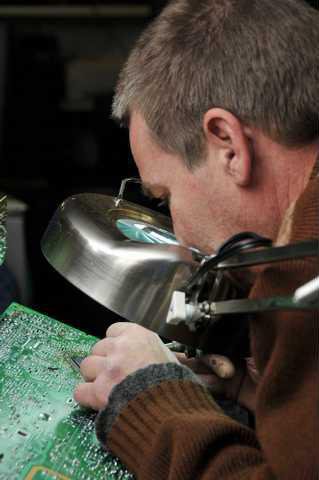People everywhere keep hazardous materials — mercury, lead and cadmium — in their living rooms.
Those materials are contained in the tubes of their televisions, so when it’s time to get rid of that old analog set, the right disposal is important.
Those harmful elements can leak into soil and streams, contaminating drinking water.
Doug Aiken of the Hall County Taxpayer Association said he is concerned that without easy access to proper disposal, Hall County residents will throw their old TVs into ditches or lakes.
"If you discard a TV, even on the edge of the road, eventually the lead and mercury will start to leak out," Aiken said.
"Mercury and lead have an indefinite life span; it’s very hazardous to people."
Some with old analog sets will opt to buy new TVs instead of investing in a converter box to outfit an old one to receive digital signals.
Crystal Smith, owner of GS Electronics in Lula, said her repair business is down as more people look to buy affordable new TVs for the digital transition. But Smith said she will occasionally keep customers’ old TVs to harvest for parts.
"It just depends on what the product is. If we think we might possibly be able to use something out of them we might take them," Smith said.
Hall County’s recycling program currently does not accept TVs because they are too expensive to process.
Natural Resources Coordinator Rick Foote said there are not enough salvageable materials in a television to make it worthwhile for most recyclers.
"About 80 percent of the weight of a TV is the glass picture tube," Foote said. "That glass is leaded glass containing anywhere from four to eight pounds of lead in the glass picture tube. That glass has to be specially processed at a certain kind of glass recycler."
Foote said the leaded glass is necessary to protect TV viewers from harmful X-rays.
"The lead is a double-edge sword. It has to be there to protect us. But if and when it goes to disposal, that lead potentially could be leeched out into the landfill ... it could be a hazard at that point."
Aiken suggested the county accept TVs at compactor sites so they could be properly transported and disposed of. He presented his concerns and ideas to the Hall County Board of Commissioners, though they have not yet taken action.
"I’m just trying to preserve Lake Lanier and the quality of our drinking water," Aiken said.
Currently, Keep Hall Beautiful is encouraging residents to take old electronics to Best Buy in Gainesville.
Cindy Reed, executive director of Keep Hall Beautiful, said offering recycling through Best Buy is the best option for the county.
"There’s such a cost. The county can’t absorb the cost of $10 per television," Reed said. "We needed an avenue to collect the televisions."
The electronics store is offering a free recycling program. The cost to recycle a TV is $10, but the cost to the customer is offset with a $10 Best Buy gift card.
Best Buy’s Customer Experience Manager Jordan Maloy said the store is offering the program as a way to give back to the community.
The company has to absorb the cost of recycling the TVs, but he feels it is important to offer an affordable recycling option.
"The program is something that has really been born out of Best Buy’s responsibility to the environment," Maloy said. "You think about the 1,100 stores that we have across the country and what we put out there it seems irresponsible on our part not to participate in some sort of take back program or at least make available to consumers the ability to have an outlet for disposal."
Reed said she has not seen as many people discarding TVs as she would have expected with the impending digital transition.
"Not a lot of people are getting rid of their TVs," Reed said.




